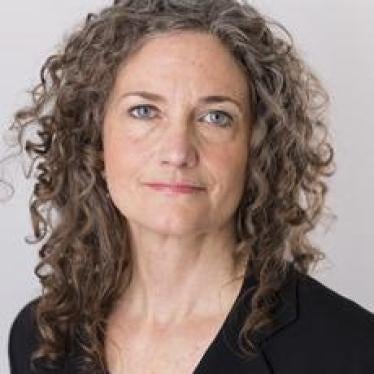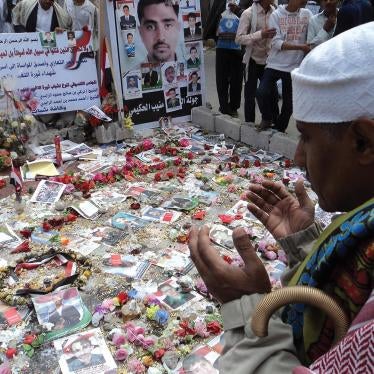Two years ago on March 18, as popular revolts swept Yemen, gunmen in civilian clothes carried out the deadliest attack on protesters of the country’s 2011 uprising. As state security forces stood by, the gunmen opened fire on protesters amassed for a rally they had named the Friday of Dignity, killing 45 and wounding 200.
“They were shooting at us directly,” Jabir al-Mandaliq, a protester who was paralyzed from the waist down from one of the bullets, told me. “I thought it was the end. I began praying to Allah, ‘There is no God but God…’ The next thing I knew I was shot.”
The big news from Yemen this March 18 is the start of a wide-ranging national dialogue conference—an ambitious effort to heal the country after the yearlong uprising that in February 2012 forced President Ali Abdullah Saleh from the office he held for 33 years. But national dialogue will mean little if Yemen’s transition government fails to serve justice for the hundreds of protesters and bystanders killed and thousands wounded during the country’s uprising. The Friday of Dignity killings, still unpunished, illustrate why.
The attack at Change Square, the heart of the protest movement in the capital, Sanaa, became emblematic of the brutal response by state security forces and pro-Saleh gangs to the pro-democracy uprising. As the protesters ended their midday prayer, the attackers set fire to a wall that local residents had built days earlier on the edge of Change Square, then opened fire. The thicket of smoke and flames helped obscure the gunmen and hindered the protesters’ flight.
A Human Rights Watch investigation into the killings found evidence that government officials were involved in the attack, and that the Saleh administration interfered with the prosecutors’ investigation in an apparent effort to hide that role.
Among many questionable actions, the Central Security Forces, a paramilitary unit headed at that time by Saleh’s nephew, Yahya Saleh, withdrew from the scene the night before the attack, despite residents’ and security officers’ repeated warnings to the interior minister that they feared a bloodbath. The Central Security Forces returned a half-hour after the shootings began but made no effort to stop the gunmen.
The security forces’ conduct may amount to complicity with the gunmen and at the very least a glaring failure to protect. But prosecutors failed to even question Yahya Saleh or then-Interior Minister Mutahar al-Masri about the attack.
That’s not surprising, given that in April 2011, President Saleh dismissed Yemen’s attorney general after he began investigating the potential involvement of government officials in the shootings.
Two months later, prosecutors indicted 78 suspects for the killings, but the trial court has listed more than half as absconders. Victims’ lawyers claim some are in plain sight and on the government payroll. Many of these defendants were former or current security force officers or members of Saleh’s General People’s Congress party.
Meanwhile, the eight defendants behind bars appear to be innocent or peripheral accomplices at best. They include a garbage collector and a homeless man with severely impaired vision. When Human Rights Watch attended a hearing in the case last September, the jailed suspects rattled the bars of their cage inside a Sanaa courtroom as relatives of those killed in the attack shouted, “The innocent are jailed and the guilty are free!”
Justice Minister Murshid al-Arshani told Human Rights Watch in February that he supports a new investigation into the killings. But without international pressure, that is unlikely. The trial judge suspended all proceedings last November after victims’ lawyers filed a motion seeking the indictments of top former and current officials, including former president Saleh, who remains in Yemen as head of the General People’s Congress, and Yahya Saleh, now in Lebanon.
That motion could serve as a test case of a law that Yemen’s parliament approved last year granting immunity to Saleh and all those who served with him during his presidency. The law, backed by the US, the EU and Gulf states as a way to induce Saleh to resign, violates Yemen's obligations under international law to investigate serious crimes. Yemenis to this day are taking to the streets to demand the repeal of the immunity law.
In a meeting with Human Rights Watch in February, Saleh—currently under threat of sanction by the United Nations Security Council for alleged meddling in Yemen’s transition—rejected outright our requests to support repeal of the immunity law. “No force, national or international, can repeal this law,” Saleh said. “All sides accepted it.”
Perhaps not. Yemen’s Supreme Court has yet to rule on the law’s constitutionality at home, and under universal jurisdiction, foreign courts seeking to prosecute serious human rights violators are not bound by another country’s grant of immunity.
Compensation to the victims of the uprising is lagging alongside prosecutions. Only in recent months have the authorities begun to dole out partial payments, equaling at most a few thousand dollars, to families of slain protesters or to severely injured survivors.
In late January, dozens of these wounded, many of them amputees, began camping outside the cabinet building in Sanaa to press their demand for medical treatment abroad. On February 12, Central Security Forces attacked some of the wounded protesters and beat a member of parliament who was demonstrating with them so severely that he was hospitalized.
When pressed on accountability, Yemeni officials rightly plead to having many burning issues on their plate. These include a Huthi rebellion in the north, armed separatists in the south, al Qaeda militants seemingly everywhere, a mysterious arms shipment allegedly from Iran, and a humanitarian crisis. But justice that falls by the wayside was a driver of Yemen’s uprising.
Concerned countries including the US and Gulf and EU states, along with the UN Security Council, can help Yemen break with the past by imposing travel bans and asset freezes on Yemeni officials implicated in major crimes during the uprising. They also can withhold assistance to security forces implicated in these crimes until those responsible are removed from the ranks and held to account.
Foreign governments also should support an international investigation into serious rights violations during the uprising should Yemeni efforts fall short.
Absent such measures, Yemenis will end up with an impunity re-run rather than the change that protesters died for on the Friday of Dignity.
Letta Tayler is a senior researcher at Human Rights Watch and author of the report “Unpunished Massacre: Yemen’s Failed Response to the ‘Friday of Dignity’ Killings.”








